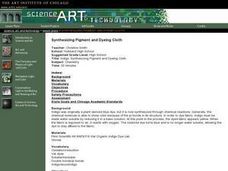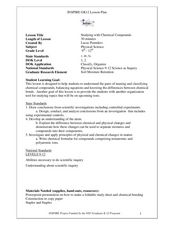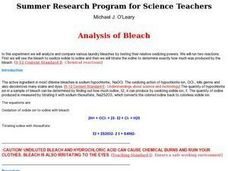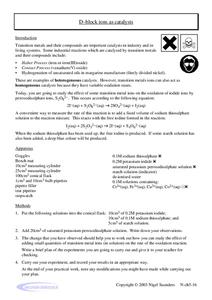Virginia Department of Education
Aspirin Analysis
Laughter may be the best medicine, but aspirin is also important. Young chemists analyze aspirin tablets using titration in this lab experiment. They then repeat the entire experiment using a different aspirin brand.
Virginia Department of Education
Average Atomic Masses
Facilitate learning by using small objects to teach the principles of atomic mass in your science class. Pupils determine the average mass of varying beans as they perform a series of competitive experiments. They gather data and...
Virginia Department of Education
Heat Transfer and Heat Capacity
It's time to increase the heat! Young chemists demonstrate heat transfer and heat capacity in an activity-packed lab, showing the transitions between solid, liquid, and gaseous phases of materials. Individuals plot data as the changes...
Science Geek
Reaction Kinetics
Show your classes the science behind rates of reactions with a presentation that explains factors that affect the rate, activation energies, exothermic and endothermic processes, and the proportionality of the product and reactant rates.
Curated OER
Synthesizing Pigment and Dyeing Cloth
Students create a synthetic dye and oxidize the dye and record the effects.
Curated OER
Rusting: A Form of Oxidation
Students observe and record the corrosive nature of oxidation-reduction reactions, and determine the electro-chemical series of selected metals.
Curated OER
Individual Gas Laws
Students learn the relationships between the different properties of a gas and use previous knowledge and make predictions. They predit and explain certain phenomena of gases using their chemical knowledge.
Curated OER
Studying with Chemical Compounds
Students create a foldable to help them remember topics on chemical compounds. In this physical science lesson plan, students differentiate ionic and covalent compounds. Given certain compounds, they identify whether it's ionic or covalent.
Curated OER
Distinguishing Between Atoms
Every type of question is used to query young chemists about atomic structure. A vocabulary list tops the page before fill in the blanks, true/false, and matching questions are listed. This is a neatly formatted and pertinent...
Curated OER
Hydrogen
Unique properties of hydrogen, its production, and reaction with other elements make this slide show uncommon. The appearance, however, is common with plain white background and only black and red font, a formatting issue on the second...
Curated OER
Pre-Lab Questions-Acids and Bases
For this acids and bases worksheet, students answer eight questions about acids and bases prior to doing a titration lab. They define both acids and bases and explain what a neutralization reaction is as well as a titration.
Curated OER
Finding the Percent of Iron in Lawnsand
In this percent of iron in lawnsand worksheet, students perform a titration of lawnsand using potassium manganate (VII) solution and find the number of moles of iron in the sample. Students use the number of moles to find the mass of...
Curated OER
Analysis of Bleach
Students analyze and compare laundry bleaches by testing their oxidizing powers. They conduct their lab experiment, compare/contrast their results with other students' work, and complete a worksheet.
Curated OER
Kinetics Practice 2-Key
In this kinetics worksheet, students solve seven problems related to chemical reactions and their rates. Students identify rate laws for mechanisms, they draw reaction diagrams, and they determine rate constants.
Curated OER
Lab 23-Follow Up Questions-Conductivity
In this conductivity learning exercise, students answer post lab questions about substances that transferred electrons resulting in electricity flowing through the conductivity leads use to test each substance.
Curated OER
Under Pressure
In this pressure worksheet, students read about Dalton's Law of Partial Pressure, about vapor pressure and about collecting gases over water. They answer 6 questions using the concepts of Dalton's Law of Partial Pressure and they solve 4...
Curated OER
The Preparation of Teraamminecopper(II) Sulphate-1-water
In this complex salt learning exercise, students create teraamminecopper(II)sulphate-1-water using copper(II)sulphate, concentrated ammonia and ethanol. Students determine the formula mass for their product, the theoretical yield of the...
Curated OER
D-block Ions as Catalysts
In this catalysts worksheet, learners use transition metals ions to catalyze oxidation reactions of iodide ions. Students measure the rate of the reactions by measuring free iodine as a product.
Curated OER
Volumetric Analysis 3-To Determine the Relative Molecular Mass of a Soluble Base
In this volumetric analysis instructional activity, students determine the relative molecular mass of an unknown group 1 carbonate by experimenting with a known amount of hydrochloric acid. Students use volumetric analysis to determine...
Curated OER
The Effect of Concentration Changes on Equilibrium
In this concentration changes and equilibrium worksheet, students experiment with iron (III) ions and thiocyanate ions to observe the effects of concentration on the equilibrium of solutions. Students make observations of their mixtures,...
Curated OER
The Reaction Between Magnesium and Hydrochloric Acid
In this rate of chemical reactions worksheet, learners experiment with different concentrations and volumes of hydrochloric acid mixed with magnesium. They measure the rates of the reactions and analyze their results from a graph they...
Curated OER
Combustion Reactions
Students write a balanced chemical reaction. They articulate how burning fossil fuels increase the carbon dioxide levels in the atmosphere. Students incorporate all the environmental risks involved as well.
Curated OER
Reactivity Series Questions
In this reactions worksheet, high schoolers read about two types of reactions that take place between metals: displacement and competition. Then students answer 2 problems.
Curated OER
Reactions of Group 1 Metals With Water
In this elements worksheet, learners complete a graphic organizer comparing observations of lithium, sodium, and potassium. Then students determine how these elements react with water. Learners complete 3 fill in the blank questions.
Other popular searches
- Basic Chemistry Equations
- Chemistry Equations College
- Word Equations Chemistry
- Balance Equation Chemistry
- Chemistry Equations Intro

























